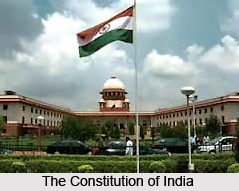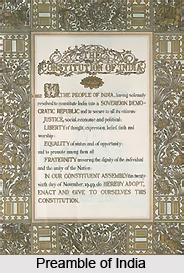 The Constitution of India lays down Directive Principles of State Policy. The policies are guidelines for the framing of laws by the government. These provisions are set out in Part IV of the Constitution. Similar to the Fundamental Duties, the directive principles are not enforceable by the courts. However, the principles on which they are based are fundamental guidelines for governance that the State is expected to apply in framing and passing laws. Thus it can be concluded that the Directive Principles of State Policy (DpSp) are guidelines to the central and state governments of India which are significant while framing laws and policies.
The Constitution of India lays down Directive Principles of State Policy. The policies are guidelines for the framing of laws by the government. These provisions are set out in Part IV of the Constitution. Similar to the Fundamental Duties, the directive principles are not enforceable by the courts. However, the principles on which they are based are fundamental guidelines for governance that the State is expected to apply in framing and passing laws. Thus it can be concluded that the Directive Principles of State Policy (DpSp) are guidelines to the central and state governments of India which are significant while framing laws and policies.
The principles of Directive Principles of State Policy are incorporated in the constitution of India based on the Directive Principles given in the Constitution of Ireland and also by the principles of Gandhism. The principles laid down are related to social justice, economic welfare, foreign policy, and legal and administrative matters. Moreover, these Directive principles are classified under the following categories: Gandhian, economic and socialistic, political and administrative, justice and legal, environmental, protection of monuments and peace and security.
According to the historical evidences, in 1919, the Rowlatt Acts gave extensive powers to the British government and police, and allowed indefinite arrest and detention of individuals, restrictions on public gatherings and intensive censorship of media and publications. All these led to public opposition and mass campaigns started demanding guaranteed civil freedoms, and limitations on government power. Thus the Directive Principles of State Policy in Irish constitution were looked upon by the people of India as an inspiration in order to independently handle complex social and economic challenges in the nation. The concept of these principles was augmented in 1928 by the Nehru Commission and in 1931 by the Indian National Congress. After India getting independence on 15 August 1947, the task of developing a constitution for the nation was undertaken by the Constituent Assembly of India. Hence, Fundamental Rights and the Directive Principles of State Policy were included in the I Draft Constitution by the constituent assembly.
 Directive Principles of State Policy aims at creating social and economic conditions so that the citizens can lead a good life. The social and economic democracy is constituted for the welfare state. Furthermore, the DpSp are essential for to curb the power of the government and they act as an instrument used to measure the performance of the government. Though the Directive Principles are not justiciable, they are fundamental in the governance of the country. It is the duty of the State to apply these principles in making laws. The DPSP helps the judiciary in deciding cases and also all executive agencies are guided by these principles.
Directive Principles of State Policy aims at creating social and economic conditions so that the citizens can lead a good life. The social and economic democracy is constituted for the welfare state. Furthermore, the DpSp are essential for to curb the power of the government and they act as an instrument used to measure the performance of the government. Though the Directive Principles are not justiciable, they are fundamental in the governance of the country. It is the duty of the State to apply these principles in making laws. The DPSP helps the judiciary in deciding cases and also all executive agencies are guided by these principles.
The Directive Principles of State Policy laid down by the constitution puts forth that the State shall strive to promote the welfare of the people by promoting a social order in which social, economic and political justice is informed in all institutions of life. The State shall provide free legal aid in order to ensure equal opportunities for securing justice. The State shall also work for organisation of village panchayat and enable them to function as units of self-government. The State shall endeavour to provide the right to work, to education and to public assistance in cases of unemployment, old age, sickness and disablement, within the limits of economic capacity. According to the principles, the State aims for securing right to an adequate means of livelihood for all citizens to men and women and offer equal pay for equal work for both men and women. Moreover, the State works to prevent concentration of wealth and means of production in a few hands, and try to ensure that ownership and control of the material resources is distributed to best serve the common good.
Prevention of child abuse and exploitation of workers and ensuring living wage and proper working conditions for workers, with full enjoyment of leisure and social and cultural activities are the principles of the Directive Principles of State Policy. The state aims at promotion of cottage industries in rural areas and secures a uniform civil code for all citizens. Children are provided free and compulsory education till they attain the age of 14 years. However, the Directive regarding education of children was added by the 86th Amendment Act of the constitution. Other directive principles provide that the state should aim to raise the level of nutrition and the standard of living and to improve public health. State should also organise agriculture and animal husbandry on modern and scientific lines by improving breeds and prohibiting slaughter of cows, calves, other milch and draught cattle. Protection of monuments, places and objects of historic and artistic interest and national importance against destruction and damage, Protect and improvement of the environment and safeguarding the forests as well as the wild life of the country come under the directive principles. The 42nd Amendment Act, 1976 added the directive regarding protection of forests and wildlife. The directive principles also separate the judiciary from executive in public services. The principles provide that the State shall strive for the promotion and maintenance of international peace and security.






